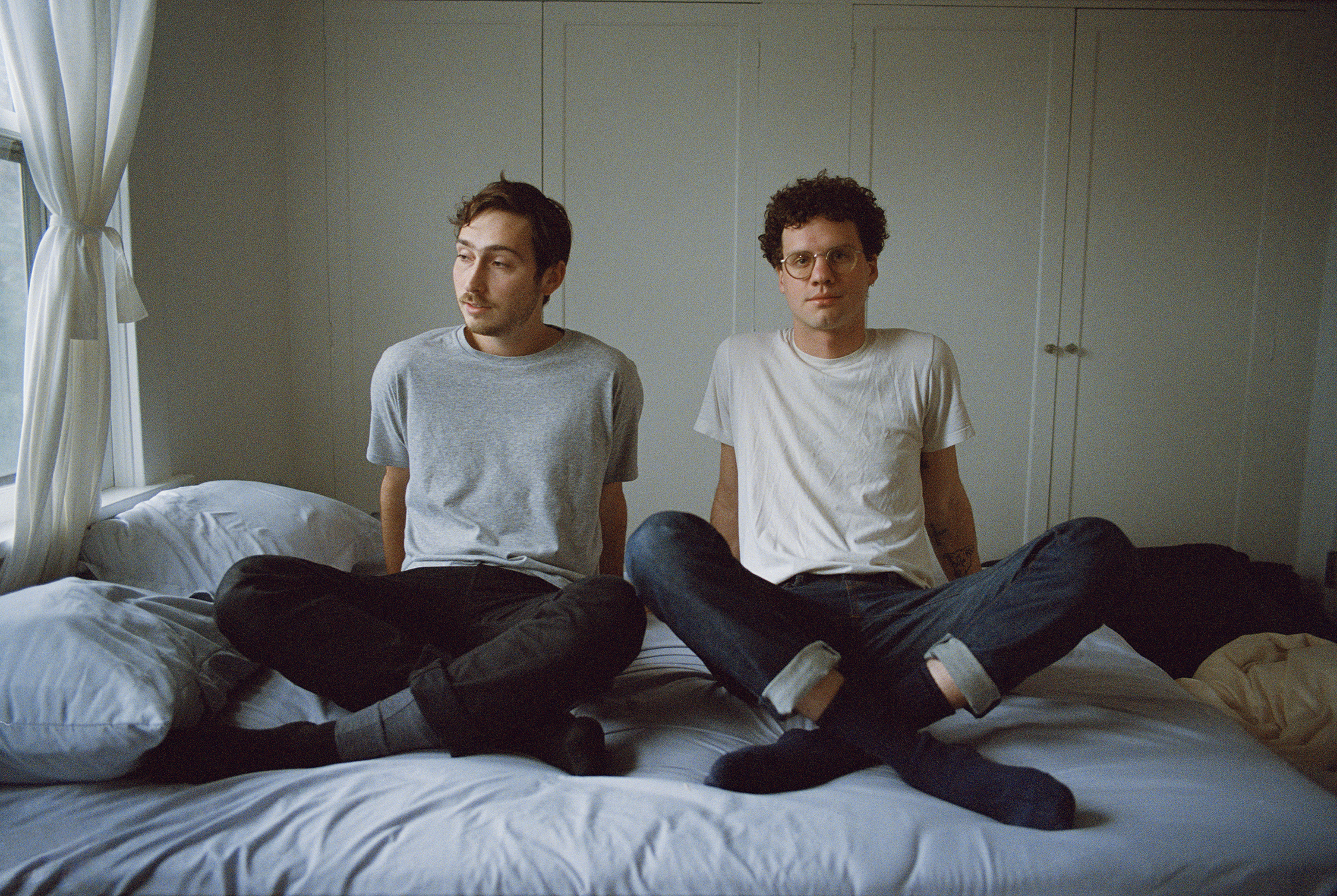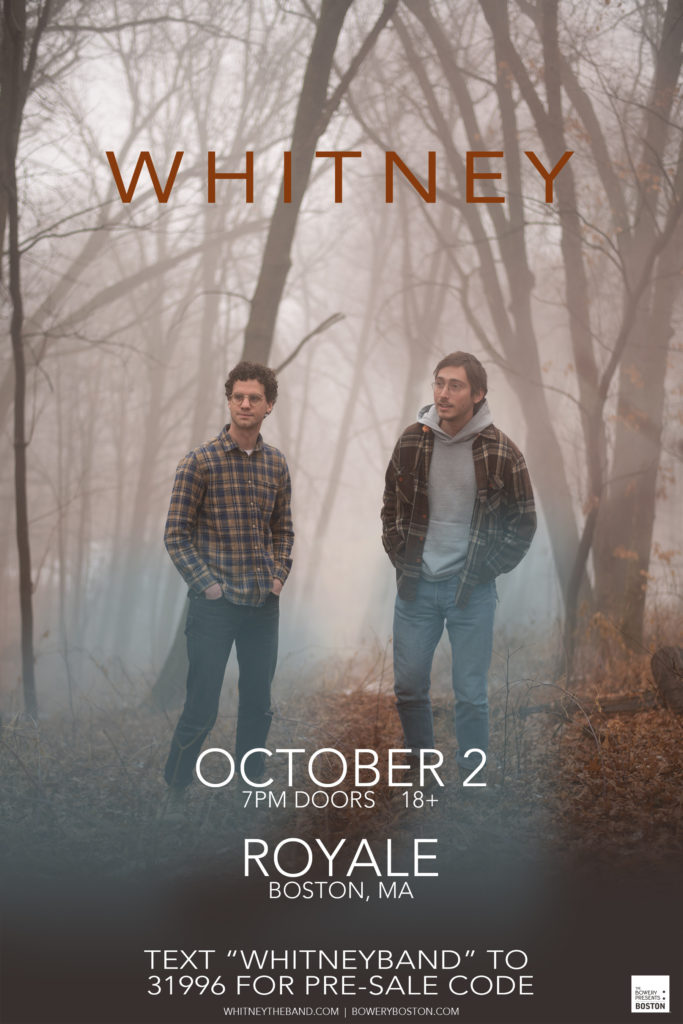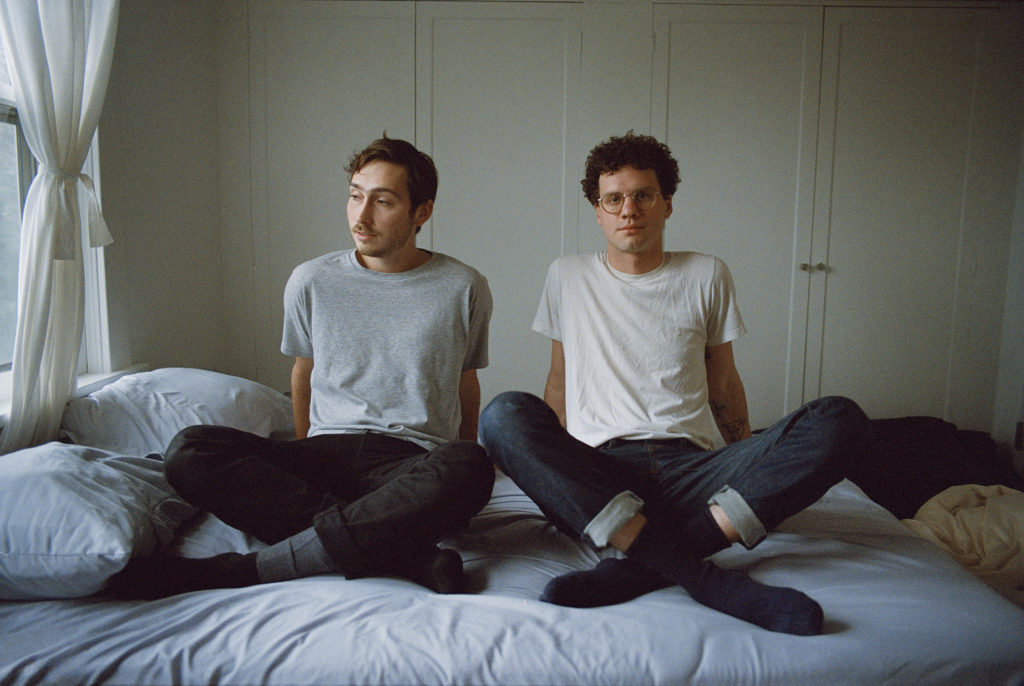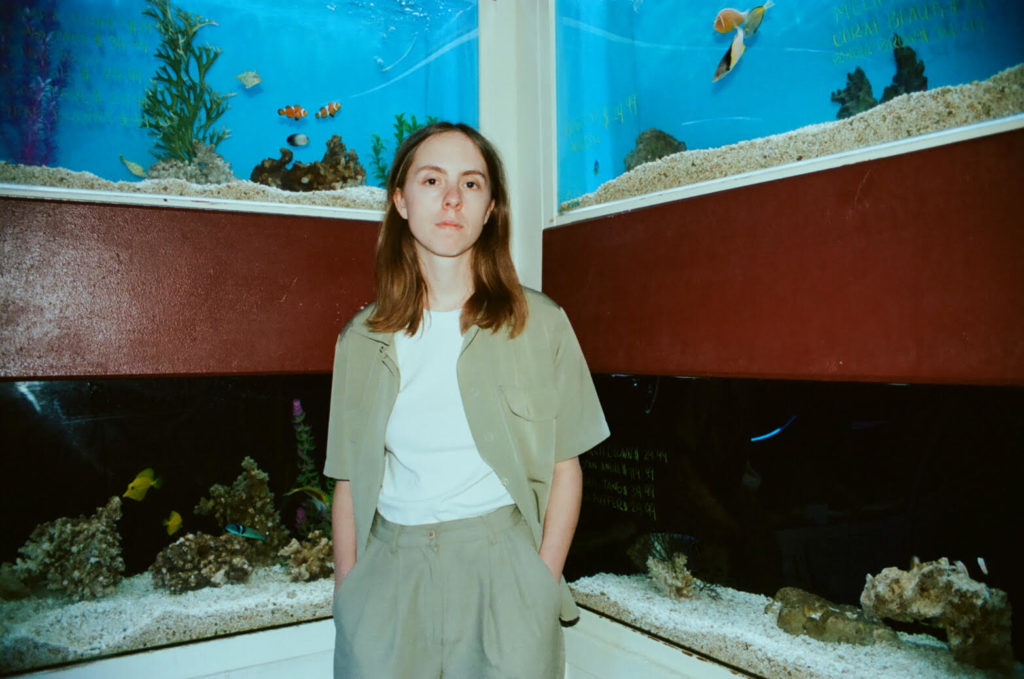Whitney

Whitney
Presented by Bowery Boston
Doors: 7:00 pm / Show: 8:00 pm
Tickets on sale Fri 3/8 at 11am!
Tickets available at AXS.COM, or by phone at 855-482-2090. No service charge on tickets purchased in person at The Sinclair Box Office Wednesdays-Saturdays 12-7PM.
Please note: this show is 18+ with valid ID. Patrons under 18 admitted if accompanied by a parent. Opening acts and set times are subject to change without notice. All sales are final unless a show is postponed or canceled. All bags larger than 12 inches x 12 inches, backpacks, professional cameras, video equipment, large bags, luggage and like articles are strictly prohibited from the venue. Please make sure necessary arrangements are made ahead of time. All patrons subject to search upon venue entry.
***
***
Whitney
Restlessness is at the heart of Whitney’s resonant and stunning sophomore album Forever Turned Around. As Julien Ehrlich and Max Kakacek realized over the past three years, life can change drastically. Priorities shift, relationships evolve, home can become far away, and even when luck momentarily works out, there’s still that underlying search for something better.
While the success of their 2016 debut Light Upon The Lake uprooted them away from Chicago to seemingly endless tours across the world, Ehrlich’s and Kakacek’s partnership only strengthened. “Our friendship has kept us going even though so much has happened in the years since we started the band,” says Ehrlich. Their bond has been the one constant as they’ve weathered the transitional period of their mid-twenties, supporting each other through bouts of heartache, loss, and uncertainty. But lately, as they’ve found home through themselves, their romantic relationships, and their friends, there’s an uneasiness that comes from stability. When Ehrlich sings on “Valleys (My Love),” “There’s fire burning in the trees / Maybe life is the way it seems” it’s a mission statement of the existential questions raised throughout.
This is what Forever Turned Around grapples with: the anxiety and acceptance that time is limited. Across 10 songs, Ehrlich and Kakacek skeptically yet masterfully navigate questions of mortality, doubt, love, and friendship in a grander scope than they’ve attempted before. It’s an album about partnership — romantic, familial and communal, but most importantly a love in friendship: the bonds between two best friends and creative partners and the joy and stress that comes with it. As Ehrlich sings on “Used To Be Lonely:” ‘Well it made no sense at all / Until you came along.” It tackles the blissful confusion that comes from seeing the way things unexpectedly change over time.
Forever Turned Around came together over several sessions across the country with its earliest material written during tour dates in Lisbon, Portugal. Though Ehrlich is Whitney’s lead singing drummer while Kakacek is the lead guitarist, when writing, both transcend their roles to piece together each offering lyrically and compositionally. “The way it ends up working is one of us comes up with a basic idea for a song and the other person serves as the foil to complicate that idea. We ask, ‘What can we change to make it more interesting?’” says Kakacek. Challenging each other is the core of their songwriting partnership. “A big thing for us is our ability to take criticism. We’re always open to new ideas. We approach it where we try to stretch a new idea as far as it can go,” adds Kakacek.
After a session with producers Bradley Cook (Bon Iver, Hand Habits) and Jonathan Rado (Weyes Blood, Father John Misty) helped color in the arrangements, the album truly revealed itself when they reunited with original rhythm guitarist Ziyad Asrar in his basement Chicago studio—the same place where they hashed out much of Light Upon The Lake. “Getting down there was so important because we’ve always used that basement for music. The comfort and familiarity mattered but having Ziyad be a buffer between us was so helpful,” says Ehrlich. With Asrar’s help, songs like “Song For Ty” and “Forever Turned Around” effortlessly came together. There, the band enlisted Chicago musicians Lia Kohl and OHMME’s Macie Stewart to provide strings throughout the record and their lush swells colorfully accent the arrangements.
Risks and experiments make Forever Turned Around a triumph like opener “Giving Up.” The track started from a stream-of-conscious revelation when Ehrlich improvised the chorus while Kakacek played Wurlitzer. What began as a nod to Neil Young’s Live at Massey Hall 1971 in an afternoon turned into a heart-rending and relatable song about the ups and downs of long-term relationships. Over twinkling piano, Ehrlich sings, “Though we started losing touch / I’ve been hanging on because / You’re the only one I love.” He explains, “In a relationship, you don’t stay at the same level at all times. You go through periods where you’re closed off.”
Whitney has long been a full-fledged band with keyboardist Malcolm Brown, guitarist Print Choteau, bassist Josiah Marshall, and trumpeter Will Miller backing them live, along with Asrar who’s returning to the fold on their upcoming tour. On the album, the wider and more maximalist songs match the tight-knit chemistry of their electric performances thanks to Tucker Martine’s immaculate mixes. “We’ve become such a well toured band and developed this groove that you can hear it all over the LP,” says Ehrlich. Though the stoner instrumental freakout “Rhododendron” is the most obvious example of this vibe, with its slinking guitar leads and Miller’s flailing trumpet lines, other songs like “Before I Know It” evoke the breezy melancholy of Labi Siffre.
Forever Turned Around is an album about relationships. It deals with how they evolve or flounder and how loneliness can creep in unexpectedly. Penultimate track “Friend of Mine” captures this sentiment beautifully. The emotional centerpiece of the album, it builds to a crescendo during the chorus with Ehrlich singing of an old acquaintance,”While you’re drifting away / Like a cloud hanging over the pines.” Happiness can be fleeting but this album proves that even when it feels like time is turning on its head and there’s either a moment of clarity or crippling doubt, there’s still beauty in figuring it all out.
—–
Josh Terry
May 15, 2019
Chicago, IL
***
hand Habits
Meg Duffy grew up in a small town in Upstate New York and they cut their teeth as a session guitarist and touring member of Kevin Morby’s band. The Hand Habits project emerged after Meg moved to Los Angeles; it started as a private songwriting outlet but soon evolved into a fully-fledged band with Meg at the helm. Hand Habits’ debut album, Wildly Idle (Humble Before The Void), was released by Woodsist Records in 2017. The LP was entirely self-produced and recorded in Meg’s home during spare moments when they weren’t touring. Wildly Idle (Humble Before The Void) is a lush, homespun collection of folk songs that found Meg in an exploratory state as an artist moving out on their own for the first time.Two years later, Hand Habits has returned with their sophomorealbum, placeholder, due out March 1st on Saddle Creek. To make this album,Meg chose to work in a studio and bring in collaborators, entrusting them with what had previously been a very personal creative process. Over the course of 12 tracks, Meg emerges with new confidence as both a bandleader and singer. This albumis as tender and immediate as anything Meg’s ever written, but it’s also intensely focused and refined, the work of a meticulous musician ready to share their singular vision with the world. The name placeholder stems from Meg’s fascination with the undefinable. Their songs serve as openings —carved-out spaces waiting to be endowed with meaning. As a lyricist, Meg is drawn to the in-between, and the songs on this new album primarily confront the ways in which certain experiences can serve as a stepping stone on the road to self-discovery. “A big aspect of my songwriting and the way I move through the world depends on my relationships with people. The songs on placeholder are about accountability and forgiveness,” Meg says. “These are all real stories. I don’t fictionalize much.” placeholder opens with the title track which on its surface is about a break-up. “Oh but I was just a placeholder/ A lesson to be learned,” a scorned Meg sings over a lush bed of twangy guitars. The blame quickly shifts, though, as Meg begins to take on partial responsibility for the partnership’s collapse: “Oh but now you are just a placeholder/ Blinded by desire/ Oh now you’re just a placeholder for someone wasting time.” Nothing in Meg’s world is as simple as black and white, right or wrong. An openness to nuance drives revelation in these songs. “I value the closeness I share with my chosen family and I’m interested in queering relationships in my music. The relationships in my life expand my capacity to love because the lines between romance and friendship are often blurred,” Meg explains. The bonds Meg addresses on placeholder extend beyond the bounds of romance. On “can’t calm down,” Meg contemplates inherited trauma and questions whether it’s possible for someone to upend patterns of familial suffering. Relatedly, the closing track, “book on how to change part II,” refers back to Meg’s mother, who died when they were young. It’s a simultaneously aching and reassuring song, buoyed in part by a saxophone and Meg’s pointed harmonies that bring levity to painful subject matter.Wildfires raged in Southern California when Meg wrote the bulk of placeholder, and the anxiety that came with living in L.A. during that time exposes itself throughout these songs. “Fire is such a powerful symbol. It’s destructive, but it’s also generative,” Meg says. References to that particular mindset abound on placeholder, most notably on the stand-out track “wildfire,” but it creeps into other songs, too. Separating side A from side B is a MIDI interlude titled “heat,” which finds Meg repeating, “Heat beyond the lines of passion,” a line borrowed from Jeanette Winterson’s novel The Passion.


